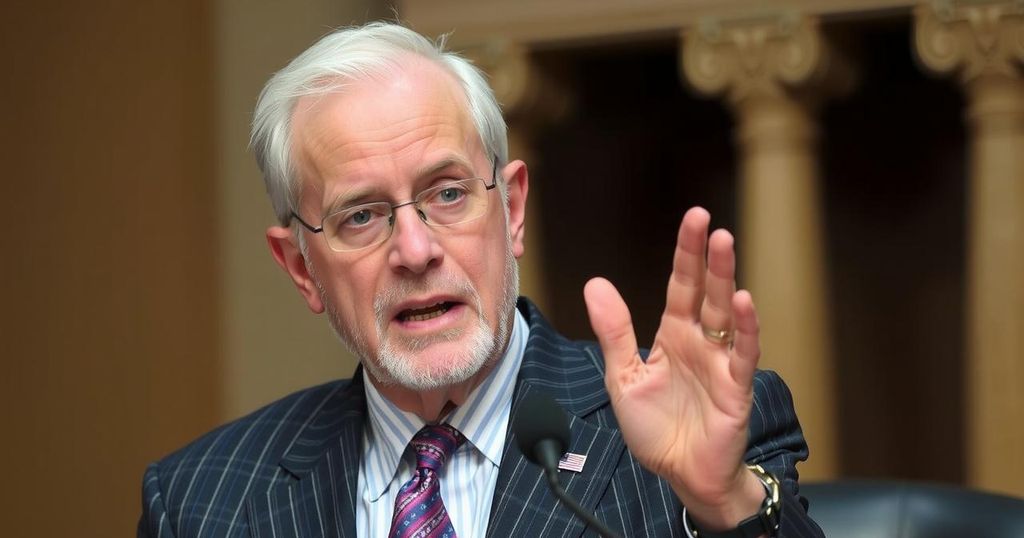Biden Deems Assad’s Fall a Moment of Justice and Risk for the Middle East
President Biden declared the fall of Assad’s government a “fundamental act of justice” but identified it as a time of significant risk for the Middle East. Amidst uncertainties regarding Assad’s whereabouts, Biden applauded U.S. efforts in diminishing support for Assad from Russia, Iran, and Hezbollah. The implications of this regime change raise complex issues for U.S. policy in the region as the Biden and Trump administrations navigate the evolving landscape of Syrian conflict and broader Middle Eastern tensions.
On December 8, 2024, President Joe Biden remarked on the rapid dissolution of Bashar Assad’s government in Syria, characterizing it as a “fundamental act of justice” given the longstanding oppression faced by the Syrian populace. However, he cautioned that this development presents “a moment of risk and uncertainty” for the entire Middle East.
During his address at the White House, President Biden noted uncertainties surrounding Assad’s current location, indicating that he might have sought refuge in Moscow. He acknowledged the significant role played by the U.S. and its allies in weakening support for Assad from key backers, including Russia, Iran, and Hezbollah. Biden proclaimed that they are no longer in a position to uphold Assad’s power.
The collapse of Assad’s regime has heightened tensions across the region, leading to complex dilemmas for both the Biden administration and the incoming Trump administration. President-elect Donald Trump expressed opinions reflecting on Assad’s flight from power, suggesting that Vladimir Putin’s waning interest in supporting Assad was a pivotal factor. In a contrasting perspective, Trump voiced his opposition to U.S. military intervention in Syria, emphasizing that “this is not our fight.”
Amidst these developments, U.S. troop deployment remains, primarily aimed at countering the resurgence of the Islamic State group. As violence persists in neighboring regions, including Israel’s conflict with Hamas and tensions with Hezbollah, both political and humanitarian concerns are escalating.
In tackling the ensuing uncertainties in Syria, national security advisers emphasized the need for a continued military presence, albeit with a focus on combating ISIS rather than a broader involvement in the ongoing internal conflict. They urged all involved parties to prioritize civilian safety while calling for a political resolution to the prolonged crisis.
Additionally, the plight of missing American journalist Austin Tice reignited public concern, with his family advocating for his safe return as the humanitarian situation in Syria continues to deteriorate under the pressure of conflict. Amidst the power shifts, the international community watches closely as the fate of the region hangs in the balance.
The current political landscape in Syria has been shaped by over a decade of civil unrest, marked by the brutal regime of Bashar Assad who has faced widespread condemnation for human rights abuses. The Syrian civil war, which began in 2011, resulted in significant loss of life and displacement, affecting millions. This turmoil has engaged numerous international stakeholders, complicating the region’s dynamics, especially in the wake of Assad’s potential downfall and the emergence of various opposition factions. The U.S. has maintained a military presence to support local allies and counter extremist threats, particularly from the Islamic State group, while balancing its geopolitical strategies in the face of shifting alliances.
In summary, President Biden’s reflections on Assad’s regime collapse illustrate a pivotal moment in Middle Eastern politics, symbolizing both justice for the Syrian people and heightened risk for regional stability. As the Biden administration assesses the implications, the focus remains on safeguarding civilians and ensuring that the ongoing struggles among various factions do not escalate into broader conflicts. The international community’s response and the actions of the incoming Trump administration will be crucial in shaping the future of Syria and its neighboring countries.
Original Source: apnews.com




Post Comment